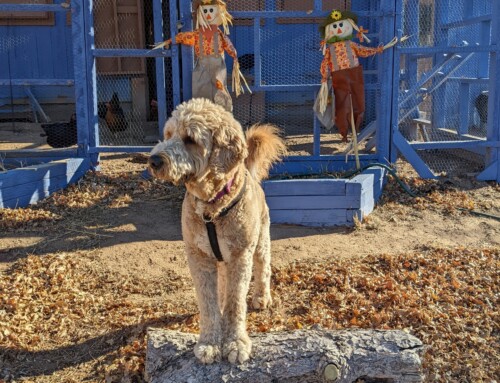DOG TRAINING OFFERED IN-PERSON AND ONLINEOur dog training services are delivered in almost any format that meets your needs. We have GROUP CLASSES at our indoor and outdoor facilities on our farm, ONLINE LIVE STREAMING classes, and SELF-PACED VIDEO-BASED training through our Online Dog Training Course. Our PRIVATE TRAININGS can be done in-home, outside, in public dog-friendly locations, at our facility on our farm, online via phone or video conferencing and through email. |
My husband came down with a cold while we were in Minnesota over Christmas. He's feeling better now, but still dealing with the lingering effects. I thought I had dodged that bullet, when just last night my nose started to run and my head started to hurt. I felt miserable all night and got very little sleep. I might look fine (or perhaps not) but I certainly am not feeling my best.
When I am not feeling my best, I can get irritable and lose patience. My concentration is not always as good and I might be slower to respond or draw knowledge from my brain as needed.
Meanwhile, a client called me this morning who I have not seen in a while. She took some classes with me when her dog was a puppy, up through about his first year. She's now dealing with some new issues that have come up. One of my first questions to her was whether the dog is in good health, and how recently he'd been to the vet for a checkup.
Whenever I see a change in behavior – or perhaps an escalation of current behavior issues – I always want to know if the dog has a clean bill of health. We know our health affects how we handle things, but we often do not consider that our dogs might not be feeling well if they are starting to display some behaviors we don't like.
If you see changes or escalations in behavior issues, your first question should be: Is my dog healthy, or is there a potential medical issue affecting him/her? If your dog is on medication for a health issue, you should always ask your vet for a fact sheet that explains any possible side effects of the medication. Also, you should ask your vet if the medical issue itself could cause any potential behavior issues of which you should be aware.
One of the most obvious examples of a medical issue causing what looks like a behavior issue is a dog who seems to lose his/her housetraining. Some people assume this is a behavior issue, but often it can be caused by a urinary tract infection or a medical issue that causes the dog to drink excessively, which in turn, makes him pee excessively.
One of my clients this fall had added a second puppy to their home. This puppy seemed to be tremendously more difficult to housetrain than the other puppy they'd brought home a few weeks earlier. The client kept thinking she was doing something wrong with this puppy, but from what she was describing to me, it didn't sound like a normal puppy housetraining issue. I encouraged her to go back to her vet, and sure enough, there was something medically going on that was causing problems.
If you see an issue crop up that you weren't dealing with previously, or an issue seems to escalate suddenly, your first call should be to your vet to rule out possible medical issues. No amount of training in the world will solve the problem if there is an underlying medical issue.
Even if you are not dealing with a medical issue that needs treatment, consider that your dog just might be having an “off” day. He might be sore from the long hike yesterday, or he might have twisted his ankle playing at the dog park. If your dog just might not be feeling well, give him a break and see if he's feeling better later.
Always consider what circumstances might be affecting your dog's ability to be his normal, well-behaved, happy-go-lucky self before you assume he's trying to pull one over on you. We're not always at our best, so why would we expect any differently from our dogs?
Our goal is to positively impact the lives of as many dogs and their families as we can, in part through our extensive library of video, infographics and text articles. |









